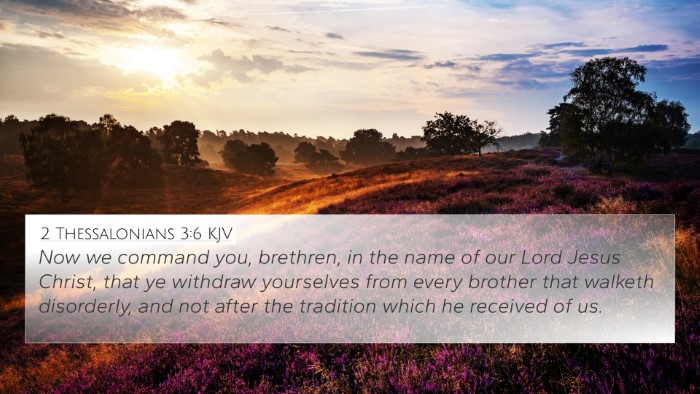Understanding 2 Thessalonians 3:11
2 Thessalonians 3:11 states, "For we hear that there are some which walk among you disorderly, working not at all, but are busybodies." This verse addresses the behavior of certain individuals in the Thessalonian church who were neglecting their responsibilities and instead engaging in disruptive activity.
Insights from Public Domain Commentaries
Matthew Henry's Commentary:
Matthew Henry emphasizes the importance of maintaining order within the church community. He points out that those who are idle not only harm themselves but also disrupt the peace and productivity of the community. Henry notes that idleness often leads to meddling in others' affairs, which is contrary to the spirit of fellowship that should prevail among believers.
Albert Barnes' Notes:
Albert Barnes elaborates on the implications of "disorderly" conduct, highlighting that such behavior can lead to gossip and conflict within the church. His commentary suggests the need for church leaders to address these issues directly and resolutely to restore order and focus on constructive work for the community's benefit.
Adam Clarke's Commentary:
Adam Clarke focuses on the term "busybodies," interpreting it as those who intrude into others' matters without invitation. Clarke stresses that such behaviors can distract individuals from fulfilling their God-given roles, causing overall detriment to the church's mission and unity.
Bible Verse Cross-References
- 1 Timothy 5:13 - "And withal they learn to be idle, wandering about from house to house; and not only idle, but tattlers also and busybodies, speaking things which they ought not." This identifies similar behavior of idleness and gossip among those who should be diligent.
- Proverbs 20:4 - "The sluggard will not plow by reason of the cold; therefore shall he beg in harvest, and have nothing." This verse emphasizes the consequences of laziness and idleness.
- 2 Thessalonians 3:6 - "Now we command you, brethren, in the name of our Lord Jesus Christ, that you withdraw yourselves from every brother that walketh disorderly, and not after the tradition which he received of us." This reinforces the need for discipline within the church community.
- Proverbs 10:4 - "He becomes poor that deals with a slack hand: but the hand of the diligent makes rich." This underscores the value of hard work and productivity as opposed to laziness.
- 1 Peter 4:15 - "But let none of you suffer as a murderer, or as a thief, or as an evildoer, or as a busybody in other men's matters." This further identifies busybody behavior as a serious detriment to personal conduct.
- Galatians 6:7 - "Be not deceived; God is not mocked: for whatsoever a man soweth, that shall he also reap." This speaks to the principle of consequences for one's actions, encouraging members to engage in productive work.
- James 1:26 - "If any man among you seem to be religious, and bridleth not his tongue, but deceiveth his own heart, this man's religion is vain." Highlights the importance of self-control and the dangers of speaking without wisdom.
Connecting Themes
The message of 2 Thessalonians 3:11 resonates with a broader theme within the New Testament regarding the impact of community behavior on individual faith and church integrity. Similar admonitions can be found throughout the Pauline epistles, where Paul consistently addresses the interactions among church members and the need for accountability and responsibility.
Thematic Bible Verse Connections
The themes of diligent work, community order, and the special role of individuals within a church can be explored through various Bible verses. The admonition against idleness in 2 Thessalonians 3:11 can be cross-referenced with verses that encourage active faith and service, reflecting the interconnected nature of biblical teachings on behavior and character.
Conclusion
In conclusion, 2 Thessalonians 3:11 serves as a vital reminder of the importance of individual responsibility within the church and the potential pitfalls of idleness. The insights from Matthew Henry, Albert Barnes, and Adam Clarke collectively underscore the need for healthy relationships and productive living among Christians. By cross-referencing this verse with related scriptures, believers can gain a deeper understanding of how to foster a supportive and active community of faith.






